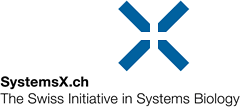Archiv
Fighting malaria through metabolism
EPFL scientists have fully modeled the metabolism of the deadliest malaria parasite. The model offers unprecedented tools for developing a new generation of antimalarial therapies to overcome drug resistance. (Image: UBern/EPFL). This research was supported by the SystemsX.ch Research, Technology and Development Project (RTD) MalarX.
Read the article published by EPFL »
Register for SystemsX.ch Retreat 2017
Presenting oneself and one’s own work is an essential skill for a young researcher. Your impact on the scientific community is dependent on the way you present yourself and your data. This is why we will use this retreat as an opportunity to actively practice short presentations, gain confidence while presenting and discover the storyteller inside each of us. The retreat will be run by hfp consulting and will take place in Kandersteg, Switzerland, from May 17-19, 2017.
More information »
Registration for the 3rd International SystemsX.ch Conference is now open!
The conference will take place from September 4 to 7, 2017 at the ETH Zurich. We look forward to welcoming you in Zurich for a host of talks by world-class scientists including keynote speakers James Ferrell from Stanford University and Chris Sander from the Dana-Farber Cancer Institute. Alongside the scientific program we are organising a number of other events, including a launch party for the upcoming SystemsX.ch film on the conference’s opening night. Abstract submission is now open for posters and the chance to give a short talk at the conference. Register before June 19, 2017 to submit your abstract and take advantage of the early-bird offer.
More information and registration »
MRD Projects: Mid-term Review
In 2015, nine Medical Research and Development (MRD) Projects were launched. The mid-term review took place in January, where the project leaders presented the progress of their projects to the SNSF expert review panel. In the first phase of many of the projects, a lot of data has been collected. Now comes the more difficult, but much more exciting part – the proper analysis and interpretation of the collected data.
More information »




